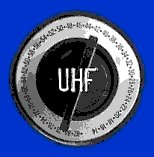by Peter Q. George
WHED-TV/15 in Hanover NH and WEDB-TV/40 in Berlin NH (along with translators W59AB in North Woodstock and W70BC North Conway) left the air in the summer of 1981. The stations had rebroadcast WENH-TV/11 in Durham, the public television flagship station in that state. WENH-TV went on the air on July 6, 1959, and for nearly a decade was the only noncommercial TV station in New Hampshire. WENH's owners (then and now), the University Of New Hampshire, wanted to expand WENH's reach in the mid 1960s to reach the 28% of New Hampshire residents (this was before cable) who could not watch WENH. So in 1967 and 1968, five additional UHF stations signed on, all rebroadcasting WENH (the sixth, translator W70BC, followed in 1971). Two of those stations, WEKW-TV/52 in Keene and WLED-TV/49 in Littleton, are still on the air today.
 WEDB-TV, WHED-TV, W59AB and W70BC bit the dust during a time of severe financial crisis for New Hampshire Public Television, the UNH department that operated WENH and it's satellites under the umbrella identification of "New Hampshire Network" (NHN). For the fiscal year that began on July 1, 1981, UNH faced a major cut in state funding. The cut was so severe that NHN, in order to survive, had to (1) eliminate a nightly newscast it had produced each weeknight since 1972 (it would be replaced by New Hampshire Journal, a weekly newsmagazine done on a much lower budget, the next year); (2) shut down WEDB, WHED and the translators; (3) lay off some employees; and (4) cutback on the broadcasting hours of the three remaining stations, WENH, WEKW, and WLED (they had never had the funds to operate any of the full-power UHFs on Sunday, and Saturday operation had already been curtailed March 22, 1975).
WEDB-TV, WHED-TV, W59AB and W70BC bit the dust during a time of severe financial crisis for New Hampshire Public Television, the UNH department that operated WENH and it's satellites under the umbrella identification of "New Hampshire Network" (NHN). For the fiscal year that began on July 1, 1981, UNH faced a major cut in state funding. The cut was so severe that NHN, in order to survive, had to (1) eliminate a nightly newscast it had produced each weeknight since 1972 (it would be replaced by New Hampshire Journal, a weekly newsmagazine done on a much lower budget, the next year); (2) shut down WEDB, WHED and the translators; (3) lay off some employees; and (4) cutback on the broadcasting hours of the three remaining stations, WENH, WEKW, and WLED (they had never had the funds to operate any of the full-power UHFs on Sunday, and Saturday operation had already been curtailed March 22, 1975).
Even then, it was touch and go as to whether New Hampshire Public Television would survive, but the network would. In fact, even as the station was undergoing through major budget cuts, one ambitious new local show scheduled to start in the fall of 1981 did premiere as scheduled: New Hampshire Crossroads, a "soft" feature magazine. Crossroads went on the air because its production costs were funded by outside underwriters, and is still on the air today. Another major local production that survived the funding crisis of 1981 -- again because production costs were funded by outside businesses -- was live coverage of most UNH home hockey games.
Although NHPTV -- the NHN name was dropped not long after the cutback -- is today as strong financially as it's ever been, full-power channels 15 and 40 and translators 59 and 70 never returned to the air. But cable has grown to such an extent that viewers in the Hanover, Berlin and North Woodstock areas can get WENH on cable, so the expenses of running transmitters in these areas has been eliminated, and money that might have gone to keeping these stations on the air can be diverted to pay other expenses of running NHPTV.
WHED-TV was revived, in a manner of speaking, as translator W15BK (now digital translator W50DP-D, although operating on channel 36 under temporary authority and likely to get new calls eventually). A major problem with the original channel 15 was that it was located atop a remote hill in the Hanover area of New Hampshire which had no commercial electric power available, so they improvised by using a diesel generator. Chances are those electric problems that plagued WHED-TV in the past have been addressed now.
This article originally appeared in the author's "UHF Morgue" at his former RadioDXer site and is republished here with his permission. Some information was provided by Joseph Gallant. Editing and rewriting by K.M. Richards.



